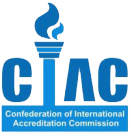What CIAC Better Business Practices Are?
Confederation of International Accreditation Commission-CIAC, Foundation is registered in the state of Delaware, USA as a private, non-stock corporation, engaged in quality assurance rating and accredited membership in major industry verticals. For India operations, CIAC Global Foundation is registered under the Companies Act, 2013 (18 of 2013) as a limited by shares company as a non-governmental self-financed agency. With over 9 years of experience, global presence and extensive network of experts, CIAC has established high standards of excellence in Best Business Practices pertaining to Quality Assurance, working as a secondary accreditation and quality rating agency after the Government regulations.
CIAC Global provides accredited membership under Better Business Practices based on dossier submission and evaluation by its governing council members who include eminent scholars & industry experts from related industries. CIAC accredited membership endorses the quality of the business processes of the concerned business establishments, working just under the government regulations in respective countries. There are numerous benefits that come with working through BBP. These benefits, if properly utilized, may help in establishing such organizations as an apt & pertinent body, providing quality output to its users.
CIAC Quality Assurance Parameters & Standards for Better Business Practices
A. Administrative & Legal Responsibilities
- Industry Identification
- Organisational Legal Standing
- Accreditation, Recognition, Affiliations & References
- Industry Facilities
- Overall Monitory Stability
- Staff Quality & Proficiency
- Industrial Values & Ethics
- Constant Improvement
B. Organizational Integrity
- Industry Analysis & Veracity
- Client Selection Criteria & Guidelines
- Legal Bindings & Contract
- General Assistance
- Additional Services
C. Product & Service Quality
- Product / Service Description
- Spends on R&D
- Training of Service Personnel
- Product / Service Documentation
- Product / Service delivery & availability
- Industry methodology & guidelines
- Client Feedback Mechanism
- Employee Proficiency
- Packaging & Branding
- Online Presence
- Promotional Activities
Better Business Practices
1. Trust & Confidence
The organizations must not only concentrate on improving the quality of their products / services but also try to earn the trust and confidence of their clients. Customer confidence or trust is built with continuous or sustained performance. A good product can be easily built by improving processes and raw material quality but sustaining to that level at all times is what most organizations must call for. The organizations must develop processes which have fixed specifications and should never compromise in terms of variations. A consistent good quality performance of a brand builds trust amongst its users and a trusted brand creates loyal clients who don’t want to leave the brand in a short run.
CIAC Global prefers the applying organization to have been operational in its activities for at least 12 months with excellent track records and consistent performance. It must adhere to industry norms & regulations which include all licenses & registrations so as not to breach the trust of its clients as well as vendors.
2. Honest & Truthful Publicity
More often the product / service advertised and the actual benefits are poles apart. CIAC Global urges its applying organizations to be always honest & truthful to its clients, vendors and share holders. While publicizing, they must abide by the local broadcasting laws of the government and other regulatory bodies in the operational countries which includes the laws for displaying logos and other publicity material. Its claims in the adverts must follow with the actual product benefits, otherwise, if there arose disputes, CIAC Global would immediately terminate its accreditation. Same will be applicable if the organization is found to have been misleading its customers by creating the false impression of sponsorship, endorsement, popularity, trustworthiness, product quality or business size through the misuse of logos, photos testimonials, or other means. To avoid situations like this organizations / institute must make the clients aware of all material facts in both written and verbal representations, remembering that misrepresentation may result not only from direct statements but by omitting or obscuring relevant facts.
3. Customer Complaints & Promise Honour
The organizations must have a customer complaint handling cell which responds immediately to complaints lodged by customer no matter whose fault it is. In today’s competitive environment, its imperative to have satisfied customers if one wants sustained growth. One dissatisfied customer can ruin the whole business if not addressed properly. For the same reasons, organization must fulfil their obligations and promises given to the customers through agreements or quotations or even through verbal communication. CIAC evaluates organization’s performance in terms of satisfied & loyal customers. CIAC even offers its mediating services via its Alternate Dispute resolution to address customer disputes but the onus is always on organizations.
4. Privacy Policy
The applying organizations must have a privacy policy that safeguard the interest of both its clients as well as itself. In today’s digital era, customer data is of utmost importance, misuse of which is rampant even in big multinationals. Organizations must protect any data collected against mishandling and fraud, collect personal information only as needed, and respect the preferences of customers regarding the use of their information. No data should be shared with any other agency unless the customer gives his written approval. Some of the data is more sensitive than other such as credit card, bank account numbers, Social Security number, salary or other personal financial information, medical history or records, etc. and its misuse should be prevented at all costs. Even transferring such sensitive data should be through highly secure means over internet. So much so that organizations must respect customer preferences regarding contact by telephone, fax and e-mail.

